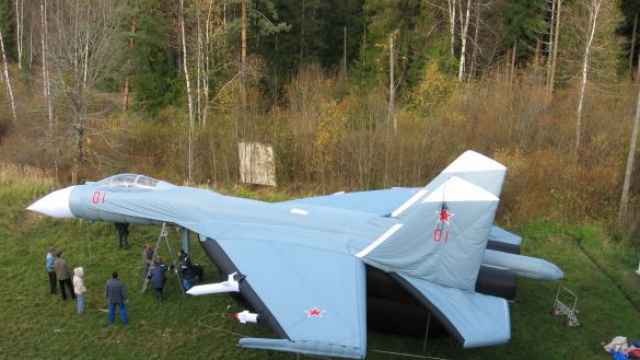If you want to advertise, Viktor Talanov says there is only one way to get people's attention: Blow something up.
No, Talanov is not referring to explosives. Talanov is marketing director at Rusbal, a Moscow company that specializes in inflatable goods and hot air balloons.
"An inflatable object — especially a big one — will of course attract more attention than a standard billboard," Talanov said.
Rusbal makes everything from inflatable corporate logos to hot air balloons decorated with the logos. Among the company's clients are Mobile TeleSystems, LUKoil and PepsiCo, according to Rusbal's web site.
Among its latest clients is cosmetics producer L'Oreal, which ordered customized transparent balls stuffed with cosmetics samples.
Talanov said one of Rusbal's clients — he refused to say which one, only that it was a store selling kitchen furniture — placed a giant inflated ball with its logo on its roof and saw sales plummet by 30 percent when the ball was removed after suffering damage.
Analysts said Russia's inflatables market demonstrated an annual growth of 18 percent to 20 percent before the economic crisis struck in late 2008. The crisis resulted in stagnation, and the market has only recently started reviving, said Oleg Klepikov, head of InFOLIO Research Group, a market research agency.
He said the market remained small and opaque, making it difficult to estimate its size and current growth rate.
Some estimates say the market grew by just 3 percent to 4 percent in 2008 and 2009, while others say it shrunk to a negative 10 percent to 12 percent.
Rusbal, which gets 20 percent to 30 percent of its profit from marketing-related inflatables, saw its sales halve last year, Talanov said.
The company doesn't disclose its financial results, but SPARK Interfax, a corporate database, said Rusbal suffered a net loss of 3.5 million rubles ($113,000) last year compared with a net profit of 7.9 million rubles in 2008. The company's revenue fell to 44 million rubles last year compared with 70.3 million rubles the previous year, it said.
Klepikov said the inflatables market was likely to reach pre-crisis growth rates over the next two years.
Talanov said sales were picking up. "Demand is quite stable," he said. "That's why we are looking into the future with optimism."
A Message from The Moscow Times:
Dear readers,
We are facing unprecedented challenges. Russia's Prosecutor General's Office has designated The Moscow Times as an "undesirable" organization, criminalizing our work and putting our staff at risk of prosecution. This follows our earlier unjust labeling as a "foreign agent."
These actions are direct attempts to silence independent journalism in Russia. The authorities claim our work "discredits the decisions of the Russian leadership." We see things differently: we strive to provide accurate, unbiased reporting on Russia.
We, the journalists of The Moscow Times, refuse to be silenced. But to continue our work, we need your help.
Your support, no matter how small, makes a world of difference. If you can, please support us monthly starting from just $2. It's quick to set up, and every contribution makes a significant impact.
By supporting The Moscow Times, you're defending open, independent journalism in the face of repression. Thank you for standing with us.
Remind me later.





